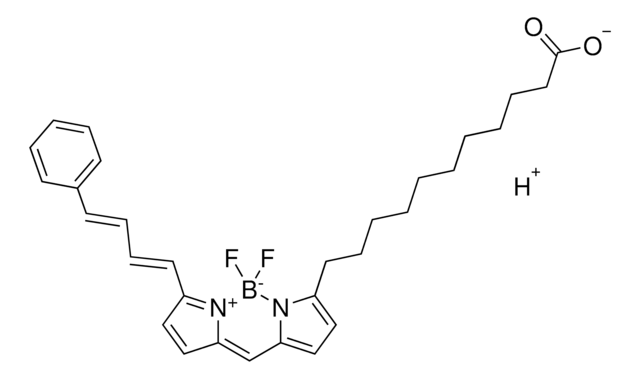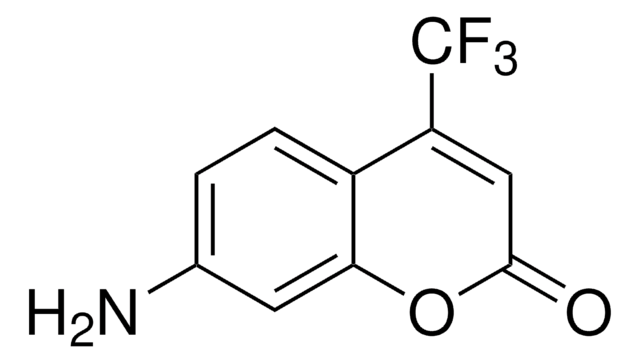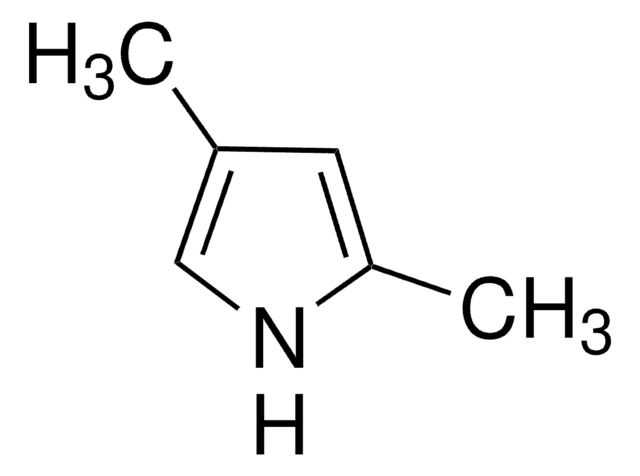790389
Difluoro{2-[1-(3,5-dimethyl-2H-pyrrol-2-ylidene-N)ethyl]-3,5-dimethyl-1H-pyrrolato-N}boron
99% (HPLC)
Synonym(e):
1,3,5,7,8-Pentamethyl-4,4-difluorro-4-bora-3a,4a-diaza-s-indacene, 2-[1-(3,5-Dimethyl-2H-pyrrol-2-ylidene)ethyl]-3,,5-dimethyl-1H-pyrrole, boron complex, 4,4-Difluoro-1,3,5,7,8-pentamethyl-4-bora-3a,4a-diaza-s-indacene, BODIPY 493/503, PM 546, PMPBF2, Pyrromethene 546, [[2-[1-(3,5-Dimethyl-2H-pyrrol-2-ylidene)ethyl]-3,5-dimethyl-1H-pyrrolato-N1,N2]difluoro]boron
About This Item
Empfohlene Produkte
Assay
99% (HPLC)
Form
powder
mp (Schmelzpunkt)
262-266 °C
Fluoreszenz
λex 493 nm; λem 504 nm in methanol
SMILES String
CC(C1=C(C)C=C(C)N1B(F)2F)=C3[N]2=C(C)C=C3C
InChI
1S/C14H17BF2N2/c1-8-6-10(3)18-13(8)12(5)14-9(2)7-11(4)19(14)15(18,16)17/h6-7H,1-5H3
InChIKey
DRJHPEGNOPSARR-UHFFFAOYSA-N
Allgemeine Beschreibung
Anwendung
Also used for solid-state dye laser devices and organic solar cells.
Signalwort
Warning
H-Sätze
Gefahreneinstufungen
Eye Irrit. 2 - Skin Irrit. 2 - STOT SE 3
Zielorgane
Respiratory system
Lagerklassenschlüssel
11 - Combustible Solids
WGK
WGK 3
Flammpunkt (°F)
Not applicable
Flammpunkt (°C)
Not applicable
Analysenzertifikate (COA)
Suchen Sie nach Analysenzertifikate (COA), indem Sie die Lot-/Chargennummer des Produkts eingeben. Lot- und Chargennummern sind auf dem Produktetikett hinter den Wörtern ‘Lot’ oder ‘Batch’ (Lot oder Charge) zu finden.
Besitzen Sie dieses Produkt bereits?
In der Dokumentenbibliothek finden Sie die Dokumentation zu den Produkten, die Sie kürzlich erworben haben.
Kunden haben sich ebenfalls angesehen
Unser Team von Wissenschaftlern verfügt über Erfahrung in allen Forschungsbereichen einschließlich Life Science, Materialwissenschaften, chemischer Synthese, Chromatographie, Analytik und vielen mehr..
Setzen Sie sich mit dem technischen Dienst in Verbindung.

![Difluoro{2-[(3,5-dimethyl-2H-pyrrol-2-ylidene-N)methyl]-3,5-dimethyl-1H-pyrrolato-N}boron 99% (HPLC)](/deepweb/assets/sigmaaldrich/product/structures/518/861/c19c64be-654e-472e-a069-30ffccb1a8cd/640/c19c64be-654e-472e-a069-30ffccb1a8cd.png)



![Difluoro(4-(1,1-dimethylethyl)-2-{1-[4-(1,1-dimethylethyl)-3,5-dimethyl-2H-pyrrol-2-ylidene-N]ethyl}-3,5-dimethyl-1H-pyrrol-2-ylidene-N]ethyl}-3,5-dimethyl-1H-pyrrolato-N)boron 98% (HPLC)](/deepweb/assets/sigmaaldrich/product/structures/207/879/8046aafd-78ca-4fd8-92dc-801de0b6cc53/640/8046aafd-78ca-4fd8-92dc-801de0b6cc53.png)





